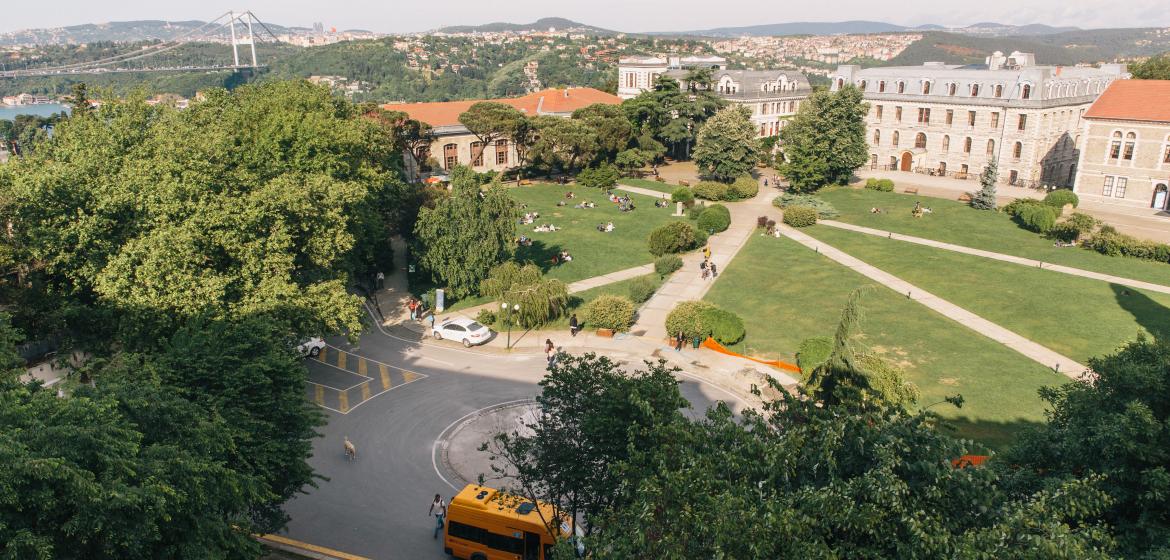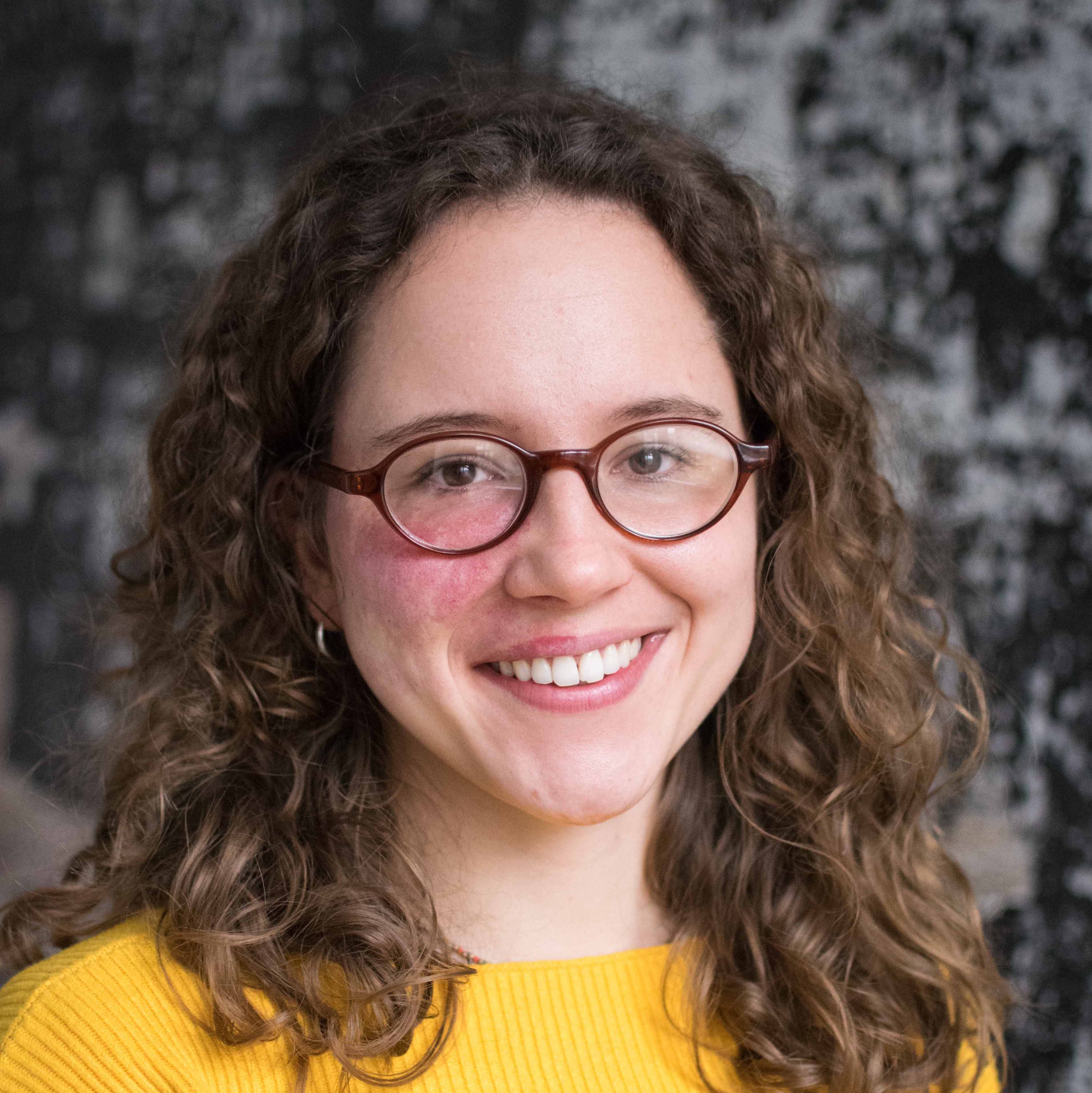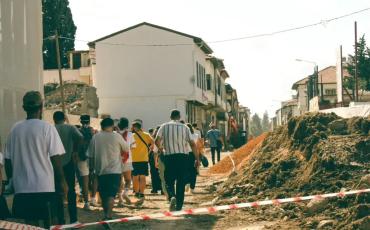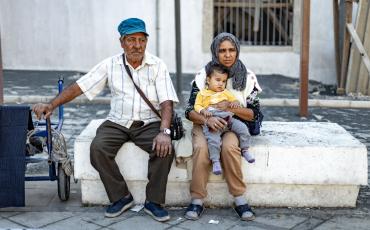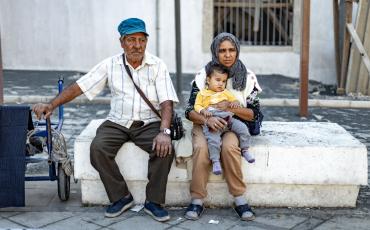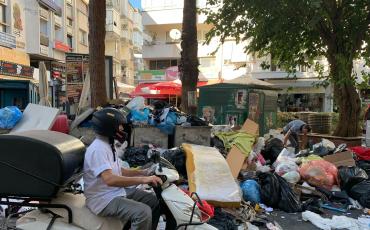After AKP appointed a new rector at Istanbul’s Boğaziçi University, protests organized by students and staff continue as they call for a democratic process. Dis:orient spoke to a student collective and one of the professors involved.
After the appointment was made public, students and professors at Boğaziçi University immediately started organizing. The campus had been empty since March 2020 and all courses had been held online because of the Coronavirus pandemic. The campus now sees gatherings, forums and public protests every day. The students called for artistic contributions to their protests and banged pots at night from their windows in the neighborhood around the university campus. Many students who left Istanbul for their hometowns due to the pandemic organized protests there.
Without a doubt, one of the more impressive scenes was the act of protest by university teaching staff. They stood on the square in front of the Rectorate Hall on South Campus of Boğaziçi University, wearing their robes. They pointedly turned their backs to the building where the newly appointed rector, Melih Bulu would soon hold office. They repeated their act on January 18th on the now snowy square to remind the public of the ongoing protest.
18.01.2021
Hocalarımız karlar arasında rektörlüğe sırtlarını dönerek protestolarına devam etti ❄️ pic.twitter.com/vt61GyRG23
— Boğaziçi Direnişi (@budirenisi) January 18, 2021
“The vast majority of students are participating in the protests.”
Boğaziçi Solidarity, a student collective running multiple social media profiles and coordinating student protests since 2013, is in the center of the current protests. Whereas their early actions evolved in the context of the Gezi Park resistance, they since protested whenever students faced state repression. On several occasions, students or staff of the university have been arrested for political reasons. In March 2018, for example, students protesting the Afrin operation were put on trial. 14 of them were detained for two months and more than 20 students received various punishments.
According to Boğaziçi Solidarity, “the vast majority of students are participating in the protests. All student clubs, including pro-government clubs, express their discomfort with this appointment. We held a referendum on campus on January 8th about whether the rector should be assigned via a democratic election. There were 917 ‘yes’ votes and one ‘no’ vote.”
In the opinion of Esra Mungan, Assistant Professor at the Department of Psychology, this unity of the students and staff is unique. The professor, who was among the signatories of the Academics of Peace’s petition in 2016, states that “the degree of consensus on the side of students, faculty, alumni and the official union against this illegitimate move is impressive. This is something we have never observed before. Erdoğan managed to bring together even the most opposed groups, since our conservative and religious students are also appalled by this appointment.”
However, besides the united criticism of the appointment there are different opinions on how far the critique should go, as Musab*, another protesting student explains: “Some of the protestors prefer to stay non-political. That entails protesting the appointment method and requesting democratic elections. Others, including me, think that the appointment has to be seen and protested as an attack of the ruling party on universities as institution. We therefore want our protests to be political and specifically aimed at the AKP.”
What might unify the students and staff in their protests is the person of Melih Bulu himself. The AKP member is highly controversial as plagiarisms have been found in both his master's and doctoral theses. Boğaziçi Solidarity makes it clear that “he is only qualified for the job on paper and harms the international reputation of Boğaziçi University”.
A long history of resistance
The reaction to the appointment of Boğaziçi’s new rector has overshadowed the fact that in the very same government gazette that announced the appointment of Mr. Bulu, there have been several other appointments for other universities. It was also not the first time for Erdoğan to interfere with university’s affairs.
Esra Mungan explains the reaction with Boğaziçi’s long history of resistance and its symbolic importance for independent academia in Turkey: “Our 157-year-old university was founded by a missionary, Cyrus Hamlin, who refused to convert non-protestant students to Protestantism, whereupon his funding by the missionary board was cut off.” But one does not have to travel that far back in time to encounter the university’s legacy as Esra continues to explain:
“Another act of civil disobedience at the university was running rector elections in 1992 while a ten-year-long rector, who had been appointed during the military junta regime, was in office. Through this act, the Council of Higher Education had to give in and introduce an election system by faculty with the president appointing any of the top three candidates.”
The student collective Boğaziçi Solidarity points out that the university had a unique tradition with those elections: “After the staff-intern elections, only the winner remained on the list that was notified to the Council of Higher Education. Everyone else withdrew their candidacy so that the president had to choose the one democratically elected by staff.”
In 2016, following the attempted coup, a decree law changed this procedure: from then on, the president would generally choose new university rectors from a list of three candidates, put together by the Council for Higher Education without consulting the respective university’s staff.
In the case of Boğaziçi this meant that the internal elections were canceled and staff member Mehmed Özkan was appointed rector. According to the student collective they did protest that appointment as well but in contrast to Melih Bulu, Özkan had served as vice-rector of the university before. He was therefore expected to ‘preserve Boğaziçi’s corporate identity’. Consequently, and also due to the general post-coup confusion and fear, their protests in 2016 were not supported by many staff.
The regime’s response
Even though Boğaziçi is not the only university affected by the 2016 decree, and though it is not the first time that the head of Boğaziçi University has been appointed undemocratically, the scale of the current protests is unprecedented. Their symbolic power is met with harsh police response and a smear campaign against the protestors on all media channels controlled by the government.
As the students report, the clashes between them and the police first started on January 4th when graduates and guests who joined the protests were prohibited from entering the campus. The official reason was the Covid-19 pandemic and hygiene regulations. “The police attacked us with tear gas and water cannons and took some protestors into custody. Early the next day, some students were arrested at their homes to prevent them from protesting. On the second day, police surrounded the school with barricades to prevent protests”, explains Musab: “However, we continued our protests on Campus and later also in Kadıköy, one of the city centers of Istanbul.” Boğaziçi Solidarity points out that even anti-terrorist units were sent to meet the protestors and that there are many undercover policemen recording audio and video on campus.
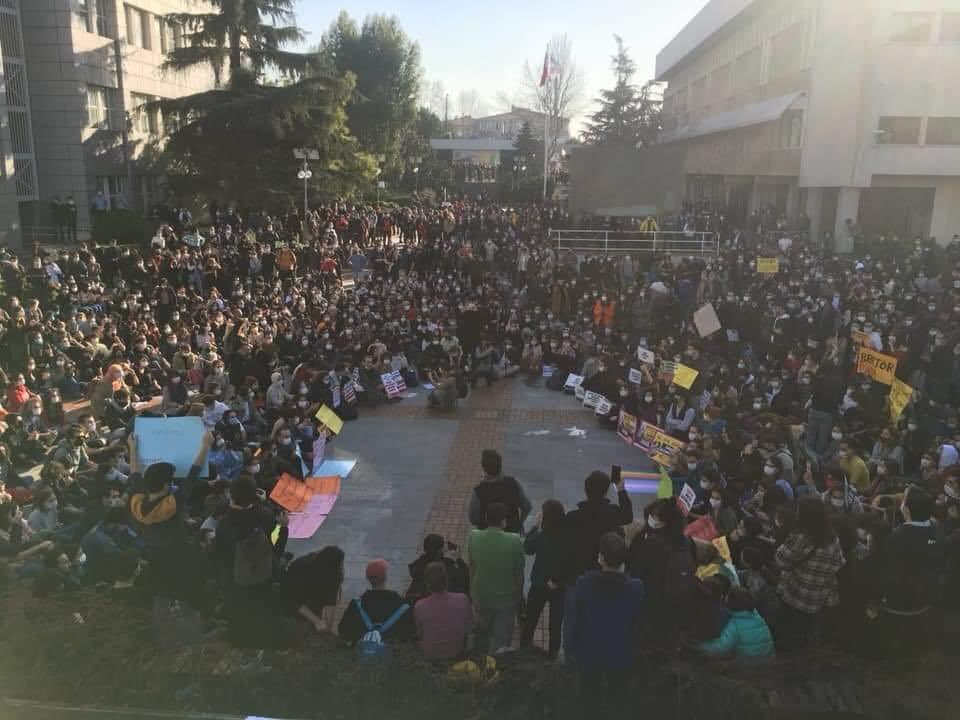
“The troll army of the regime in social media is famous."
In addition to repression on campus the protestors also face a campaign by the mostly state controlled media outlets in Turkey. As both Esra Mungan and Boğaziçi Solidarity highlight, the regime is also present on social media: “The troll army of the regime in social media is famous. It didn't take long for them to label everyone who participated in the protest as terrorists - the president himself used this term. In recent years, everyone who is not a member of the AKP risks being called and treated as a terrorist”, the student collective declares.
On the other hand, alumni and students from many different universities across the country and even from universities around the world have protested in solidarity with those immediately affected. As a result, even though the state media and the president himself try to discredit them, Boğaziçi Solidarity assume that large segments of society are with them.
Esra Mungan agrees: “With every additional illegitimate step on the side of the regime, the protests, particularly by the youth and the women's movements, resonate more and more in the general public.” For her, the fact that the ruling regime lost all major leading cities of Turkey during the local elections of 2019, is a clear indication of that dynamic.
“This will be a long and patient struggle.”
Both the students and assistant professor Esra Mungan expect the conflict to last. It is the government’s aim to dominate not only in the political arena, but also in the fields of culture, education, and arts, the students explain: “They want these places to conform to the governmental ideology and they have achieved this to a large extent. It is not an exaggeration to say that Boğaziçi University is one of the last few lighthouses of academic freedom.”
Seeing the spaces for academic, and generally speaking, freedom of expression shrink, the students do not want to back down: “Demonstrations will continue regularly on campus until the rector resigns. It is not likely that the regime will agree to any compromises. On the other hand, students will also not give up their demands. It is difficult to predict what will happen.”
Musab hopes that the appointment will backfire and that the protests will force the AKP “to find soft way of solving the problem without losing face.” The appointment of a new rector is seen as an attack on one of the last pockets of academic freedom in the country and therefore the protestor’s demands exceed the immediate case as well: “Our goal is to get the 2016 state-of-emergency decree canceled and bring back rector elections not just to our university but to all universities in Turkey. Science can only function in a climate of freedom!”, declares Esra Mungan.
*Name changed by the editors.
For updates on the protest see https://twitter.com/boundayanisma and https://www.instagram.com/bogazicidirenisi/ and for English tweets https://twitter.com/dokuz8news.

